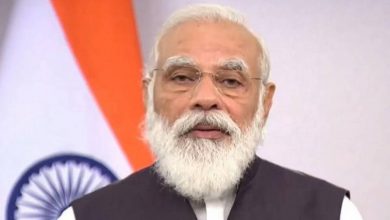Vice President calls for comprehensive law to make land registrations litigation-free
New Delhi: The Vice President of India, Shri M. Venkaiah Naidu has called for a comprehensive, model law to make land deeds, transfers and registrations litigation-free.
Releasing a Book titled ‘Land Registration, Global Practices & Lessons for India’ written by the Chief Secretary of Himachal Pradesh, Shri B.K. Agarwal, here today, Shri Naidu also called for digitization of land records so that every transaction is hassle-free.
The Vice President suggested that the Centre and the State governments should act together in a Team India spirit to bring out a comprehensive law on land-related issues.
Observing that land is the basic source of livelihood for about 50 per cent of the Indian population, Shri Naidu stressed the need for a legally-binding document on land ownership.
Calling for ensuring minimal interface between the people and the officials dealing with land issues, including registration, to eliminate corruption, the Vice President urged the Centre and State governments to move in the direction of simplifying the procedures and making them totally transparent.
Shri Naidu lauded the Prime Minister Shri Narendra Modi for his reformative approach in governance and the establishment of the National Institution for Transforming India (NITI) Aayog. He said the transformation was aimed at improving the lives of the people.
Appreciating the book written by Shri B.K. Agarwal, Shri Naidu said it would be of equal importance to all the common man, law makers and policy makers. The book would fill the existing gap of research in the field of land registration and maintenance of title records in our country.
The CEO of NITI Aayog, Shri Amitab Kant and the Solicitor General of India, Shri Tushar Mehta and other dignitaries were present at the book release function.
Following is the text of Vice President’s address:
“First of all, I would like to congratulate Mr. B.K. Agarwal for his insightful work on land registration systems in the Indian context.
The title of the book ‘Land Registration–Global Practices and Lessons for India’ is self-explanatory and reflects the importance of the subject. This book is of equal importance to all– the common man, law makers and policy-makers.
While there are two broad categories of land registrations systems—the Deed Registration and Title Registration, the book deals with a whole gamut of issues relating to land registration systems and makes a comparative analysis of the prevailing systems in our country and six developed nations– Germany, U.K., Australia, U.S.A., France and the Netherlands.
We all know that country is dominated by peasantry class and land disputes are a common source of friction at various levels. The book has noted that a third of cases pending in the Indian courts involve dispute over property.
Land related laws and practices are very important in our country. Since long, ‘Haakim’ culture has dominated the psyche of our rural populace. It is mainly due to the lack of awareness about the laws and practices prevailing in the country.
The laws particularly regarding the land and revenue matters are age-old and required amendments from time-to-time to suit the prevailing situation in our country. Moreover, rapid urbanization and the lust of grabbing more and more land for posterity are of great concerns and need to be addressed by take corrective measures within due course of time.
In this context, this book is really a fruitful one and will fill the existing gap of research in the field of land registration and maintenance of title records in our country.
The Govt. of India has already taken steps to do away with obsolete laws that have no relevance in the present context. There has been considerable thought on the issue of title registration as well.
As the author points out, the Government of India has taken a policy decision to change-over to the system of conclusive title in the country but the states are not very confident in going for such a massive change in the legal system. Consequently, while this issue frequently finds mention in the reports of experts and the policies of the government, not much is happening of the ground.
It is because the states will have to make large scale changes in the administrative and legal set up relating to land records and land transactions.
I appreciate the efforts of Mr. B.K.Agarwal, a senior bureaucrat of Indian Administrative Services, presently serving as Chief Secretary of Himachal Pradesh Government, for compiling this analytical research work. He has also made certain recommendations for improving the land registration system in the country.
The author, while noting that the Indian deed registration system together with record-of-rights has many points of strength, observed that it can be made more reliable if the registrar is allowed to verify prima facie the ownership of the transferor.
Mr. Agarwal has first-hand knowledge of land disputes and prevailing practices due to his vast experience right as a bureaucrat right from Sub Divisional Magistrate level to Joint Secretary in the Union Government.
I feel that the interface between the people and the officials dealing with land issues, including registration, has to be minimal to eliminate corruption. All states and the centre should move in the direction of simplifying the procedures and making them totally transparent.
I am quite sure that this book will really go a long way in helping the practitioners of law relating to land and property, policy makers looking at land-record reforms and also the law students, aiming to understand the Indian land registration system.
I once again congratulate Mr. Agarwal for bringing out the book and extend my good wishes for the success of the book.

